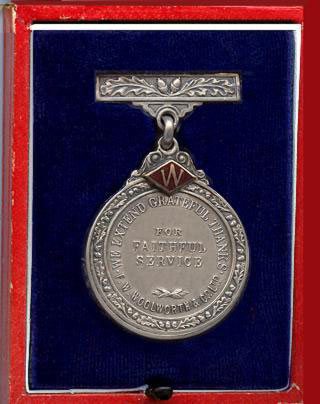The Woolworths Museum
A management career with Woolworth's
The dedicated service of William Charles Pell
With special thanks to Pam Jones (née Pell)
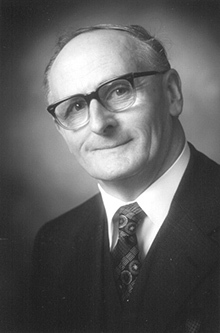
This page celebrates the career of Mr William Pell, who joined Woolworth's as a learner before the Second World War and rose up through the ranks to manage stores throughout the country. Bill's loyal and dedicated service was typical of the career path, and gives an insight into the demands, challenges and rewards of store management. The Woolworths Museum is very grateful to Pam Jones (née Pell) for researching and documenting her father's career and sharing it with our visitors.
The picture on the left was taken in 1972. It appeared in the Woolworth’s Pictorial Record of Executive and Management Personnel two years later. Bill later oversaw the opening of the large, ultra-modern store at 17-21 Potter Street, Bishop's Stortford in Hertfordshire. When the picture was taken, he had already worked for the High Street retailer for thirty-four years.
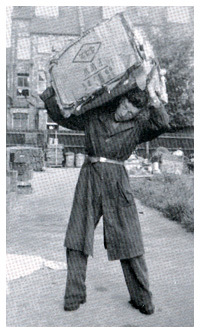
Bill started his career in the stockroom at the busy store in Clapham High Street in South West London (No. 442). He joined as a learner at the age of seventeen in 1938. His duties included hard physical work receiving, unpacking and sorting shipments of goods. Many items were packed in wooden boxes filled with straw to protect them in transit. Others were sent by train in huge re-usable cardboard cannisters that were easy to off-load at the station. The cases had to be carried to a receiving area, broken open and their contents checked against a manifest, before the stockroom manager entered the details in the store Freight Book. Any breakages or shortages had to be recorded and claims raised with the supplier, using a pre-printed postcard. Once the receipt had been recorded, Bill had to put the goods away neatly in the relevant department's 'bins' (stockroom shelving), and let the sales staff know what had arrived.
Learners joked that stockroom training was designed to turn them into Popeye, with bulging biceps and string to hold their trousers up. In reality it sought to help them learn about the range and the suppliers who made it. When the training was complete they would know all the 5,000 items, their cost prices (drawn from the packing notes) and, their 'call numbers' (supplier item codes). The grounding helped them to become successful store managers, earning big bonuses on their sales. It was drummed into every learner that their hard work would be repaid many-fold by rewards later in their careers.
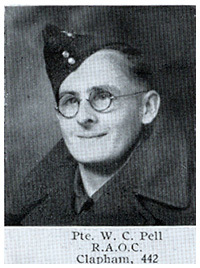 Bill joined Woolworth's at a difficult time. After a year of sabre-rattling, Britain declared war on Germany in 1939. The Clapham High Street store was in a busy London suburb, adjacent to one of the City's major tram depots and was on the main 'A3' arterial road, about three miles from the Houses of Parliament. The area became a prime target during the Blitz, forcing extra precautions in the store, as the windows were shuttered and the stockroom staff took it in turns to stay overnight as fire-watchers. All were trained to use makeshift stirrup pumps to extinguish any fire ignited by German incendiary bombs.
Bill joined Woolworth's at a difficult time. After a year of sabre-rattling, Britain declared war on Germany in 1939. The Clapham High Street store was in a busy London suburb, adjacent to one of the City's major tram depots and was on the main 'A3' arterial road, about three miles from the Houses of Parliament. The area became a prime target during the Blitz, forcing extra precautions in the store, as the windows were shuttered and the stockroom staff took it in turns to stay overnight as fire-watchers. All were trained to use makeshift stirrup pumps to extinguish any fire ignited by German incendiary bombs.
His store duties became harder as other stockroom staff were conscripted. Bill held the fort for eighteen months, before himself being called up for war service in April 1941. He served as a Private in the Royal Army Ordnance Corps.
Shortly before he was demobilized Bill married Joan Moore in October 1946. Instead of enforcing his legal right to return to his old role in Clapham, he informed the Metropolitan District Office of his plan to set up home in Nottingham, and asked to transfer to Birmingham District.
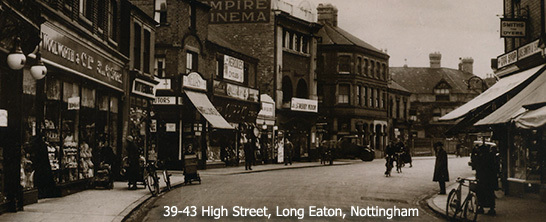 Married learners with settled home lives were highly-prized, and it was agreed that Bill would resume his training in Long Eaton, Nottingham.
Married learners with settled home lives were highly-prized, and it was agreed that Bill would resume his training in Long Eaton, Nottingham.
On arrival he found that much had changed. Despite its old fascia, it seemed everything was over 6d. Some sixpenny (2½p) lines from 1939 had rocketed to three shillings (15p), and there were fancier items too, costing 5/- (25p) or more.
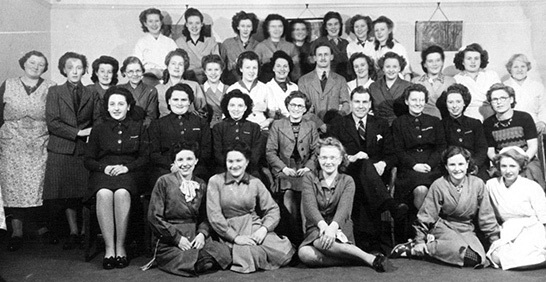
Bill reported to the Manager, Mr.
H. S. Bendall, who had joined the company in 1935 as a learner, and had only recently taken up his first store management role at Long Eaton. The two were the only males out of a complement of thirty-eight.
Bill ran the freight operation, with Saturday boys assisting with the donkey work after school.
Between 1947 and 1949 Bill and Joan became the proud parents of two girls, Pamela and Christine.
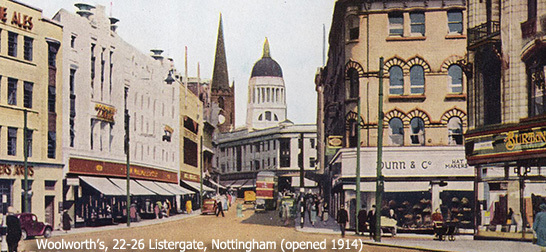 Good reports about Bill's progress in Long Eaton brought promotion in 1948 to the role of Floor Man at the flagship store in Listergate in Nottingham City Centre.
Good reports about Bill's progress in Long Eaton brought promotion in 1948 to the role of Floor Man at the flagship store in Listergate in Nottingham City Centre.
The duties were similar to a Duty Manager in a supermarket today, deputising for the Manager and overseeing the service and team of supervisors on the huge salesfloors. The branch was twenty times larger than Long Eaton and boasted a customer restaurant and extended food displays.
,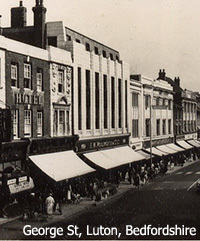
Woolworth expected its management to move around the country regularly, with up to a quarter of store, deputy and assistant managers moving each year, mainly after the annual stocktake in January. They could be sent anywhere within their own District. Each of these administrative areas covered about a third of the Country. At its southern tip the Birmingham District skirted the northern fringes of Greater London. It stretched to Penzance in the South West, the Potteries in the North West and the wilds of Northumberland in the North East.
In 1951 William Pell found himself posted, with his family, from Nottingham to a very similar large store in George Street, Luton, Bedfordshire, where it was hoped he would introduce the same high standards that he had championed at Listergate. During his time as Floorman he planned and delivered spectacular displays to mark the Coronation of H.M. Queen Elizabeth II in 1953, as well as the introduction of new departments like collectable Postage Stamps of the world and an extended selection of paints, polishes, hand tools and hardware.
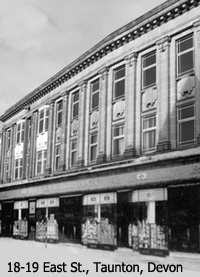
As post-war austerity measures were relaxed, Woolworth began a very rapid programme of store openings, which brought new opportunities for learners and accelerated their progress through the chain. As soon as the festivities for the Coronation were over, Bill was invited to step up take on the exalted role of Deputy Manager in Taunton, Somerset. Once again he and his family had to up-sticks for his career to progress, relocating 180 miles from Luton and even further from Nottingham.
All of the large stores had a Deputy Manager, who took day-to-day control of operations, freeing his boss, known as the General Manager, for strategic and community work. The role was the final step as a learner. If a 'DM' distinguished himself he could look forward to a store of his own, normally after five to ten years as a 'number two'.
The West Country staff took Bill to their hearts. They worked hard to improve display and service standards under his regime and welcomed him and his wife on the social scene at events like the 1954 Christmas celebrations shown below.
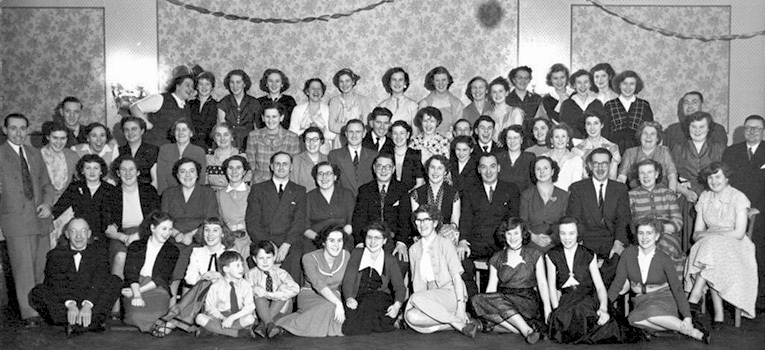
Woolworth stores continued to be managed as benign dictatorships, following the pattern operated before World War II. In the strict hierarchy the Store Manager issued instructions to the Deputy Manager in a thorough morning inspection. His Deputy then delegated the work to Assistant Managers and Floormen, who in turn assigned the work to Supervisors, each with responsibility for around ten sales staff. The larger stores operated their stockrooms along similar lines, with the Stockroom Manager reporting to the Deputy Manager and overseeing a team of Freight Clerks and Warehousemen or Women. The Deputy Manager had to establish his authority to prove himself ready for a store of his own. His progress was tracked by a Superintendent who oversaw the management of twelve to fifteen stores, and completed regular planned inspections that reviewed every area of store operation in detail against a thick pro-forma document.
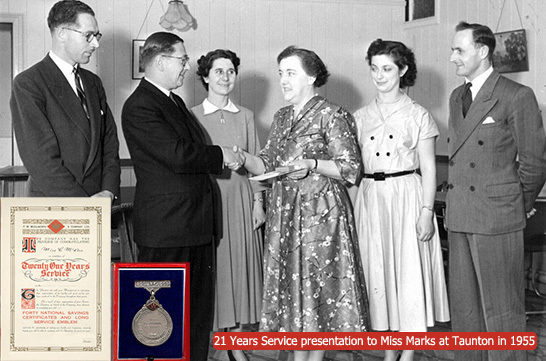
In a world where managers changed regularly, staff loyalty was highly prized. Long service was rewarded with generous gifts, and both holidays and Christmas bonuses were awarded on a graduated scale according to the length of an employee's service.
The landmark anniversaries of twenty-one and forty years service were marked by the company with a commemorative certificate, a generous gift of Forty National Savings Certificates and a Silver Medal. The firm also funded a big knees-up for every employee at the relevant store, either in the staff canteen or a local dance hall or restaurant.
By 1955 Bill Pell had completed twelve years of rigorous training for management. He knew every product in the range and was adept at controlling Woolworth's complex bureaucracy of forms and procedures. Above all he commanded respect from his staff and set stretching but attainable standards. He received a summons to London to the new District Office in Kensington High Street. A reorganisation had created a new 'Kensington District', overseeing the branches in the northern part of Greater London and all points west, and the new District Manager, Mr. J.L. Farmer, wanted to meet him.
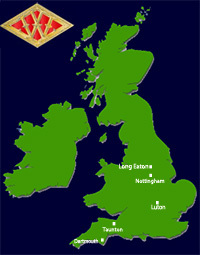 Typically a summons meant some special project or short secondment to work on a task-force, but the DM had something altogether better in mind. Woolworth's had acquired the freehold of a building at 13 Victoria Road, Dartmouth, Devon. The Construction Department was about to begin work to convert it into a brand new store and aimed to make it ready for opening in time for peak Christmas business. The boss had decided that Bill would be the perfect Manager, and would need to begin by recruiting its staff from scratch as soon as possible, so that they could be trained in time to merchandise the store during October.
Typically a summons meant some special project or short secondment to work on a task-force, but the DM had something altogether better in mind. Woolworth's had acquired the freehold of a building at 13 Victoria Road, Dartmouth, Devon. The Construction Department was about to begin work to convert it into a brand new store and aimed to make it ready for opening in time for peak Christmas business. The boss had decided that Bill would be the perfect Manager, and would need to begin by recruiting its staff from scratch as soon as possible, so that they could be trained in time to merchandise the store during October.
It was a great honour to open a new store, which was normally reserved for seasoned Store Managers. Bill was told he was more than ready and could be relied on to make '910' the Company's best ever. He had to decide on the spot whether to accept, moving his family seventy-five miles south and west from their home near Taunton. In stages they had now been required relocate a staggering 357 miles from where he had started out in Long Eaton. His first store was almost as far as it was possible to go without leaving the mainland. Joan became a dab hand at moving house. Pam and Christine, Bill's daughters also had to cope with continual changes of school. They observe that "it was a bit like being part of a military family!"
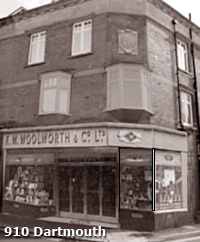 The Dartmouth building was unusual. Habitually when the Construction Department bought a freehold site it was cleared and a new store was built from the ground-up. But, to obtain a foothold in the resort, existing premises occupying a corner plot in Victoria Road were adapted, retaining their elegant bay windows at first-floor level, with a standard four-door shopfront to the latest design below. As preparation work continued, the opening became the talk of the town. Bill hired sixteen women and one man from the local area to complete his team.
The Dartmouth building was unusual. Habitually when the Construction Department bought a freehold site it was cleared and a new store was built from the ground-up. But, to obtain a foothold in the resort, existing premises occupying a corner plot in Victoria Road were adapted, retaining their elegant bay windows at first-floor level, with a standard four-door shopfront to the latest design below. As preparation work continued, the opening became the talk of the town. Bill hired sixteen women and one man from the local area to complete his team.
By Wednesday, November 9, 1955 the shop looked spectacular, with gleaming displays of Christmas lights and garlands alongside the traditional offer of buckets and bowls, pots and pans, paints and polishes, and a spectacular display of sweets and loose biscuits. The stage was set for curtain-up on Thursday morning, one day ahead of schedule to avoid a crush on Remembrance Day. In keeping with a longstanding tradition Bill and his team spent Wednesday afternoon entertaining and serving tea to the local press, other traders and civic dignitaries. All were impressed that Woolworth's had built such a fine store for a total outlay of just £8,000.
New store packed within minutes of opening its doors
Chronicle Staff Reporter
Focal centre of Darmouth yesterday was the new Woolworths store which opened for business at 9am. By that time a queue of 150 women had formed outside and the pavement opposite was massed with spectators. Children going to school called on the way to do a spot of window gazing as the staff inside bustled about making last minute preparations for the invasion.
All through the week there had been interested knots of people watching the progress of the conversion. The store was brilliantly lit from scores of fluorescent tubes and they had been able to see the construction of counters and the gradual change of scene of apparent chaos to the familiar orderly array of counters attractively stocked with goods of every description.
Late on Wednesday night people were still gathered outside watching a cleaner mopping the floor, the final part of the preparations.
First customer arrived at 7.30am. She was Mrs. Emily Long, of 13 Church Road, Townstal. Asked for her views on the new store she said "It will be a great boon to Dartmouth, and I wish it every success.
"It should bring prices down and I hope the rest of the traders will follow suit. Most people get paid on Fridays and as the store open on Saturdays, it will give them plenty of chance to come and buy."
Mrs. Lang said she had nothing particular in mind to buy - she was going to have a general look round.
Mrs. Annie Hine, of 2, Mayflower Close, Townstal, was the next to arrive ten minutes later. She said "It's a lovely job and will shake things up in Dartmouth.
FREE GIFTS
Customers were slow to arrive and by 8.30 only 11 were present. From then on numbers increased rapidly as zero hour approached. The queue, quiet and orderly, turned into Lake Street, and shortly before nine numbered about 150 - all women.
Just on nine o'clock the new manager, Mr. William Pell, who is staying at the Ferry Guest House, came to the front door and admitted the first three customers.
Inside he handed each of them a carrier bag containing a patterned bone china half tea set with the compliments of the management.
Mrs. Lang thanked him and wished him every success in the new store.
The third customer, Mrs. Blanche Bullen, of 13 Fairview, said she was very much impressed with the layout and smart clean appearance of the store. It was going to be a tremendous asset to the town particularly when the summer season came round.
The presentation over, the main doors were opened and the crowd surged in spreading out in all directions. Within seconds almost, the store was a seething mass of people.
At first it was just a reconnaisance expedition but as eyes lighted on bargains the first sale was made and soon there was an almost continual ringing from the cash register bells.
Among the shoppers was Mrs. Freda Scardifield, a local magistrate. She said "This is what we needed and wanted for years in Dartmouth. They have them in every other town so why not here?
"I hope this will lead to the other shops opening on Saturdays. If they want business they will have to compete and that should be good for everybody - including the traders."
It was an almost all-female expedition. Apart from the staff only three men - looking rather sheepish - were to be seen.
As the morning progressed more customers arrived to the give the new store the once-over. Many young children were given sweets and chocolates by the manager.
Mr. Herbert Carlisle, Woolworth superintendent for the Exeter division, has been in general charge of the rebuilding and will be staying here together with other supervisory staff for the first week.
from the Dartmouth Chronicle, Friday 11 November 1955
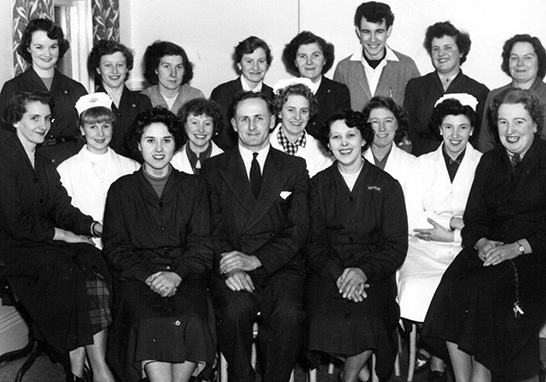
The store was a hit! Bill's daughter Pam recalls that all the staff were new and had a steep learning curve to do things the company way. Just eight weeks into his tenure, Mr Pell had to oversee the annual inventory. Every store had to do a complete stock count between Christmas and New Year.
In the days before computers every item was recorded on paper, with the pages collated into an 'Inventory Book'. Even wrappings, heating oil and staff uniforms had to be logged. The rationale for the timing was that stock was at its lightest, but paid little heed to the Christmas holiday and the staff's family commitments. Everyone was expected to work late to complete the task.
Pam, who was then aged 7, remembers that all the family were brought in to help. She vividly remembers sitting on the floor counting hat pins which were stuck in a sponge! She notes 'Bill had a good relationship with his staff and I believe it was a happy team'. The staff magazine, The New Bond, Vol XV No 3 June 1956, made the same point. It included a photograph of Bill and his new team (above). Alongside the usual caption welcoming the store to the chain, the editor had added 'Such a pleasant group we feel and oh! what a lovely spot to be on any day in June!'
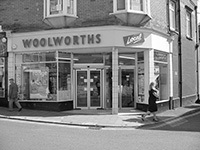
Bill spent three happy years in Dartmouth. During this time sales went from strength to strength. Unlike some resort stores, it proved popular with the public in the low as well as the high season, returning one of the highest profits per foot of counter space in the West Country. It is a testament to the firm foundations laid by Mr Pell, that the store prospered until the final days of the chain, remaining profitable as it was laid low by mistakes elsewhere in the twenty-first century. Many of Bill's staff worked their whole careers at '910', and he was fondly remembered as 'dad' to a fine Woolies.
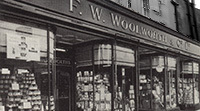 In October 1959 Bill was summoned to Kensington District Office for a review. The boss needed his talents elsewhere, posting him to nearby Teignmouth. It was a considerate move. While Bill would transfer from a bright, new store to a quaint and more old-fashioned one, it was bigger, paid a larger salary and had more 'bonus-potential'. He could commute while finding a new home, minimising the disruption to his family. He took full advantage, ultimately opting to stay at the store for twelve years, allowing Pam and Christine to complete their secondary education uninterrupted!
In October 1959 Bill was summoned to Kensington District Office for a review. The boss needed his talents elsewhere, posting him to nearby Teignmouth. It was a considerate move. While Bill would transfer from a bright, new store to a quaint and more old-fashioned one, it was bigger, paid a larger salary and had more 'bonus-potential'. He could commute while finding a new home, minimising the disruption to his family. He took full advantage, ultimately opting to stay at the store for twelve years, allowing Pam and Christine to complete their secondary education uninterrupted!
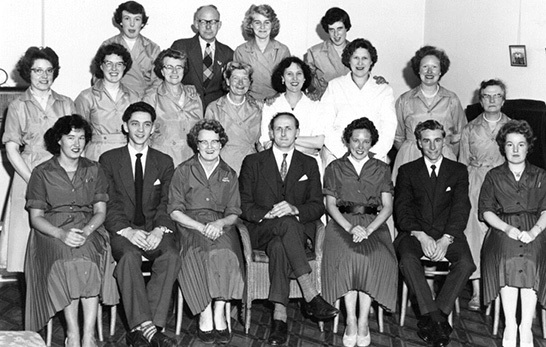 1959 marked Woolworth's Golden Jubilee in Britain. Bill had spent the summer months explaining to shoppers how a bright, new store like Dartmouth, which was under three years old, could be marking its fiftieth birthday, and encouraging them to snap up the many bargains in the extended Jubilee Sale.
1959 marked Woolworth's Golden Jubilee in Britain. Bill had spent the summer months explaining to shoppers how a bright, new store like Dartmouth, which was under three years old, could be marking its fiftieth birthday, and encouraging them to snap up the many bargains in the extended Jubilee Sale.
At Teignmouth no-one could doubt that the firm was long-established. The store had opened its doors on 19 March 1932 and, save for its fascia, retained all of its original features. The high island counters were made of the best mahogany, while every shopper was greeted by the distinctive sweet aroma of the oil and felspar used to treat the wooden floor.
Bill inherited a loyal, long-serving staff and a strong local customer base. The store made good year round sales on staple lines like buckets and bowls, weigh-out sweets and loose biscuits. A merchandiser prepared slip orders for these 'bread and butter lines', which the Manager meticulously checked before they were sent to the suppliers by post. But the lion's share of profits were contributed by seasonal ranges, both at Christmas and in the summer months, when thousands of holidaymakers descended on the town. Procedure dictated that 'Seasonables' had to be ordered up to a year in advance. Years of training had taught Bill that these were 'the Manager's Departments', meaning he handled the ordering and planning of the displays personally. Ordering the right things would maximise sales and profits and keep stock losses and write-offs to a minimum, helping both the store and its boss to prosper.
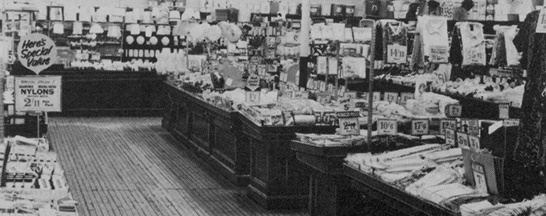 Displaying some of the new ranges was a challenge. Budget fashions and the latest outdoor toys had high potential during the summer season. But Woolworth's Buyers rarely considered the needs of older stores with fixtures from before the war. Bill had to improvise hanging rails to show the casual blouses, shirts and beachwear to advantage, and to 'blue-pencil' (that is not order) all the collars and nylon ties!.
Displaying some of the new ranges was a challenge. Budget fashions and the latest outdoor toys had high potential during the summer season. But Woolworth's Buyers rarely considered the needs of older stores with fixtures from before the war. Bill had to improvise hanging rails to show the casual blouses, shirts and beachwear to advantage, and to 'blue-pencil' (that is not order) all the collars and nylon ties!.
Throughout the 1960s the Teignmouth store continued to operate the personal service model, under which customers paid for their purchases separately at each counter. Most of the displays allowed shoppers to inspect the merchandise, collect together the items that they wanted and present them to an assistant. But they had to point to the items that they wanted at the 'weigh out' counters, where an assistant would bag their pic'n'mix, biscuits or even fresh fruit and vegetables for them. The approach, which had suited pre-war customers, seemed out-of-date to holidaymakers who regularly visited a store that had been modernised, where they were used to collecting sweets into a tray and handing them over to be weighed and wrapped.
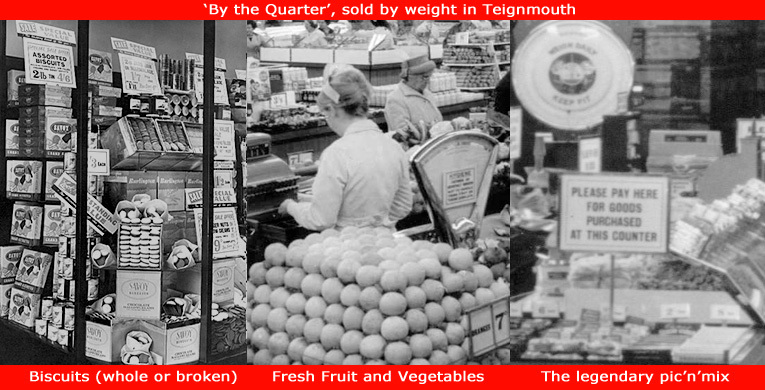
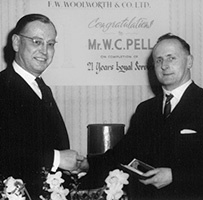
In March 1965 Bill marked a major milestone in his career, belatedly celebrating twenty-one years service. Controversially, because he had moved from Metropolitan to Birmingham District, the time he had spent serving the cause of freedom in the armed forces had not been counted, meaning the award was made twenty-seven years after he first joined the business. His boss, the District Superintendent Mr R.T. Collett, commended him for quite exceptional service over all of that time, determined to set the record straight. As a thank-you for his commitment and integrity, the Board had sent Bill a gold Omega watch, which had been specially engraved.
The Directors also bankrolled a celebration for Mr & Mrs Pell, fellow managers and their family and friends, and put up extra money for the next staff party in-store. Today Bill's grandson Stephen is proud to wear the watch in his memory.
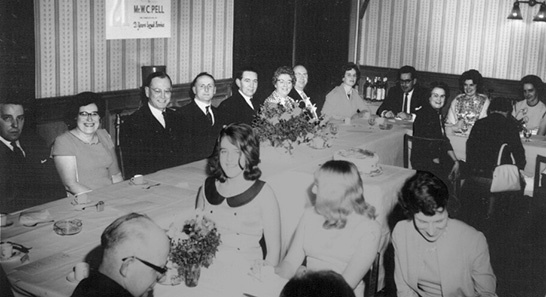 Guests at the celebration included: (top table L to R), Brian Salter (Dartmouth), Mrs Joan Pell, Mr R.T. Collett, Bill Pell, Stan Terry (Torquay), Dot Cockwill (Dawlish), Mr. K.F. Daniels (Brixham) and Mrs Stan Terry.
Guests at the celebration included: (top table L to R), Brian Salter (Dartmouth), Mrs Joan Pell, Mr R.T. Collett, Bill Pell, Stan Terry (Torquay), Dot Cockwill (Dawlish), Mr. K.F. Daniels (Brixham) and Mrs Stan Terry.
Foreground: Mr. Ruby (Stockroom Manager), Pam and Christine Pell (daughters).
Three retired members of staff had sent Bill a set of hairbrushes, while Dot Cockwill gave a travelling rug, as she knew this was de rigeur for any Manager too frugal to light the boiler before opening time !
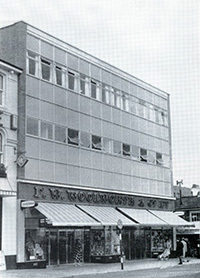 Teignmouth was hard to manage. Labour costs had to be tightly controlled, with seasonal temps and Saturday staff covering the peak periods in the Summer and at Christmas. New people had to be hired and trained each year, and needed extra supervision to maximise returns. To assist District Office sent Management Trainees or Floormen for the Summer. They had to stay in lodgings. Bill took them under his wing, regularly joining the family on Sunday outings to the beach. Woolworth's was trying to reinvent itself. It was investing every spare penny on giant ultra-modern stores. The pace of store openings in Britain and Ireland had slowed, as the focus had moved to the Commonwealth, and to creating Department Stores in the largest cities. With the exception of a handful of conversions to self-service each year, little was done to modernise the smaller stores. It must have been frustrating to see his own store ageing as a huge makeover turned Paignton (right) into a huge superstore in 1966.
Teignmouth was hard to manage. Labour costs had to be tightly controlled, with seasonal temps and Saturday staff covering the peak periods in the Summer and at Christmas. New people had to be hired and trained each year, and needed extra supervision to maximise returns. To assist District Office sent Management Trainees or Floormen for the Summer. They had to stay in lodgings. Bill took them under his wing, regularly joining the family on Sunday outings to the beach. Woolworth's was trying to reinvent itself. It was investing every spare penny on giant ultra-modern stores. The pace of store openings in Britain and Ireland had slowed, as the focus had moved to the Commonwealth, and to creating Department Stores in the largest cities. With the exception of a handful of conversions to self-service each year, little was done to modernise the smaller stores. It must have been frustrating to see his own store ageing as a huge makeover turned Paignton (right) into a huge superstore in 1966.
In London, the Buyers built new, higher-priced ranges like Clothing and Sports Goods which were intrinsically harder to display and manage, particularly in the more old-fashioned stores. Kensington District Office sent out hundreds of pages of typewritten memos on blue paper each week, each with instructions for Managers about the quality of displays, customer service, cleanliness and stock control. Bill Pell took all of this in his stride, distilling the content and delegating it to his team in a digestable format.
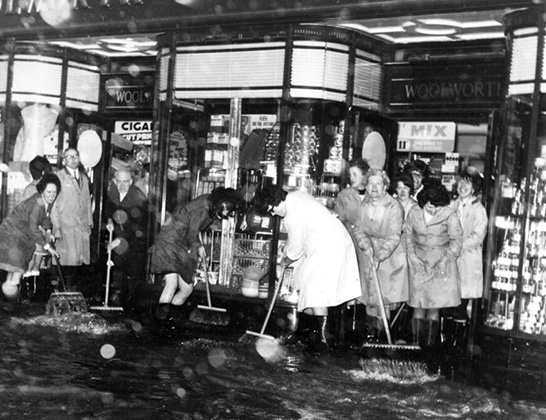
The store also had to battle with the elements. The town lay below the level of the sea wall and was prone to flooding. Given a high tide, heavy wind and rain, the sea would pour into the town and from the street into the store. Sometimes a surge headed straight for the stockroom, bursting out of a manhole cover at high tide.
Bill took on the role of King Canute, calling on all hands to help beat back the waves and keep his stock and store dry. Team spirit meant that everyone was glad to help, knowing that the boss would be there, in his stockman's coat sweeping for dear life!
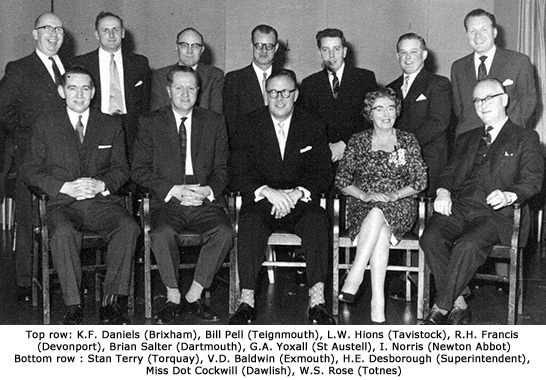 Controlling one of the smaller stores could be a lonely job. Managers were encouraged to remain aloof from the staff to build gravitas. Instead local managers formed a close-knit group of friends.
Controlling one of the smaller stores could be a lonely job. Managers were encouraged to remain aloof from the staff to build gravitas. Instead local managers formed a close-knit group of friends.
They pooled sales ideas, work-arounds for some of the daily grind of display and procedural problems, and generally put the world to rights in regular phone calls, and trips to the occasional hostelry for a pint.
The company encouraged the camaraderie, which was considered excellent management practice. Even the District Superintendent joined in; it is said that he may perhaps once have stumped up for a round.
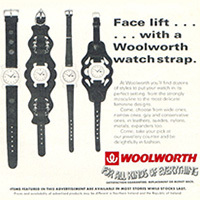 Bill and his family had become settled in Teignmouth. His daughters' schooling was going well and by the late Sixties the store ran like clockwork, with a Pell procedure for everything. But his Superintendent had to brooch a difficult subject. Despite his admiration for the standards in-store and its exemplary performance compared with neighouring branches, the Kensington District operated a hard-and-fast rule that (unless they were about to retire or in poor health) Managers had to move after ten years. This was because other stores needed their skills, and even the best managed branch sometimes benefitted from a new pair of eyes.
Bill and his family had become settled in Teignmouth. His daughters' schooling was going well and by the late Sixties the store ran like clockwork, with a Pell procedure for everything. But his Superintendent had to brooch a difficult subject. Despite his admiration for the standards in-store and its exemplary performance compared with neighouring branches, the Kensington District operated a hard-and-fast rule that (unless they were about to retire or in poor health) Managers had to move after ten years. This was because other stores needed their skills, and even the best managed branch sometimes benefitted from a new pair of eyes.
The DM had relaxed the rule as decimalisation loomed, but after 'D day' in February 1971 there would be a reckoning, with up to half of the Managers transferring. The new money would be a particular challenge in Teignmouth as the boss wanted him to halve the number of tills in use.

Bill was relieved that that this would allow the girls to finish their schooling, and saw that it would boost his salary and help him to build a larger pension. Ironically, weeks after rejigging the store to reduce the number of tills and departing for pastures new, the District decided to 'crash convert' Teignmouth to self service. Over just four days thermoplastic tiles were affixed over the polished floor, and the cherished wooden counters were ruthlessly smashed to pieces, and replaced by cheap 'mesh' shelving. Every expense had been spared to 'modernise'.
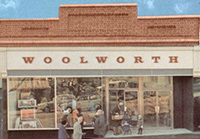
By this time the Pells were far away. He had been sent to the historic market town of Bishops Stortford, to take the helm at '<316>'. The store had first opened its doors in June 1928, and had proved a goldmine from the start. It had been extended in 1934 and 1936, and had been extended again in 1966, when it had also been modernised. His new Superintendent had fought to get a seasoned and experienced Manager, and treated Bill as an elder statesman. Far from running down towards retirement, he would have his work cut out.
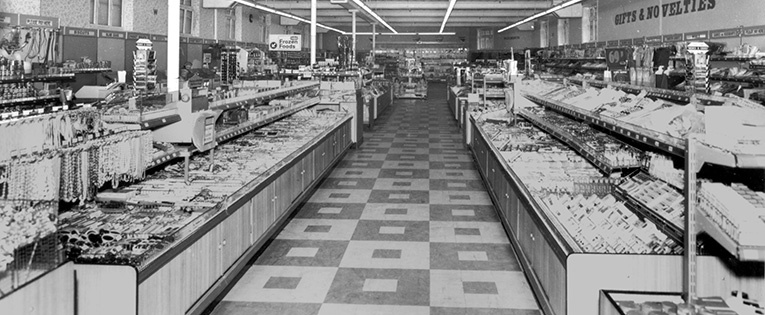
The Town Council had grandiose plans to modernise Bishops Stortford, aiming to stem the loss of shoppers and business across the county line into Essex, where many were drawn to Harlow New Town and Chelmsford. During the early Seventies they devised a scheme to redevelop the town centre, investing millions to divert a river away from the town. The plan envisaged a major shake-up in Potter Street, which was home to Woolworth's, replacing the ramshackle array of older shops and pubs with a modern High Street. Executives at District Office believed that by participating in the scheme they could generate the same sales uplifts that they had achieved at a new store in Harlow, which had opened in 1967, and by trebling the size of the branches in Chelmsford and Colchester, enlisting Bill's help to campaign for the changes and engage the Council at every stage.
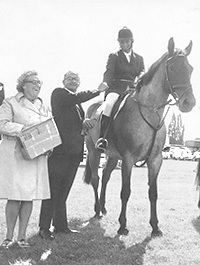
A higher profile at District Office brought rewards on the social scene. As the Company developed its Winfield brand and range of sports goods, it sought to improve its PR. This led to a series of sponsorship deals, including the Hertford Horse Show. In 1974 executives invited Bill and his wife Joan to present the trophies at the show. Bill usually preferred to watch the horse racing but it was a great day out, especially for Joan who loved show jumping but usually only got to watch it on the TV.
Such rewards helped to make up for very challenging work back at the store. Woolworth Properties offered to mastermind the controversial redevelopment scheme in Potter Street, pulling down all the shops and pubs to the left of his store, and building a giant new branch next door, along with a further parade that they planned to sublet to local traders. Years of noise, dust and local traders' frustrations were to follow. As the man on the spot Bill's diplomacy was regularly called on to pour oil on troubled waters. He kept the peace, and watched as the huge superstructure took shape, not knowing it would be his to manage.
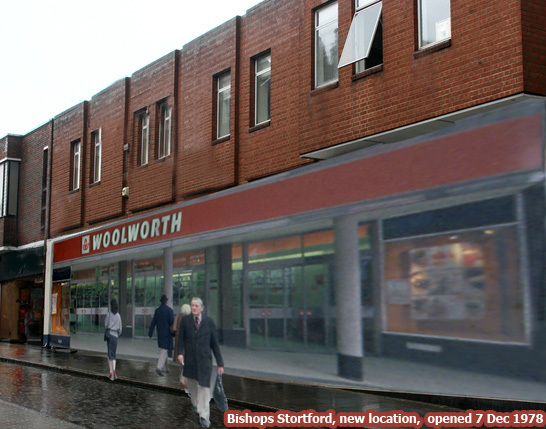
In 1978 Bill marked forty years since joining the Threepenny and Sixpenny Stores in Clapham. While there was no set of golf clubs, as executives still maintained that his war service didn't count as he had moved stores, they were able to offer the one thing that would be more valuable to a loyal and dedicated Woolworth man.
Bill was confirmed as the Manager of the spanking, brand new Woolworth store next door, which was one of the finest in the land.
The old branch closed on November 18, giving him just under three weeks to move the merchandise, prepare the old premises for a new tenant, and break in a new, much larger team at the new '<316>', which had to be 'picture perfect'.
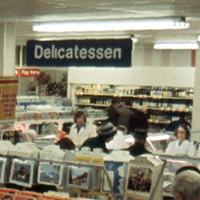 The new superstore brought a steep learning curve, with whole new departments to master and resource. Employees were rushed through food safety courses to teach them to slice bacon and handle meats and cheese in the new large delicatessen department, and had to start work early in the morning in a specially-fitted preparation room upstairs. Fresh milk and bread was also delivered and merchandised early every morning.
The new superstore brought a steep learning curve, with whole new departments to master and resource. Employees were rushed through food safety courses to teach them to slice bacon and handle meats and cheese in the new large delicatessen department, and had to start work early in the morning in a specially-fitted preparation room upstairs. Fresh milk and bread was also delivered and merchandised early every morning.
Bill had to hire a 'Drapery Supervisor' to oversee the huge new range of fashions carried in the new range. He also had to contend with the foibles of a new centralised ordering system ('COS') which allocated some goods at the behest of Executive Office in London, particularly clothing based on Kimball Tags attached to the products. Much of the opening range was assigned, meaning he had far more goods than he could display or sell.
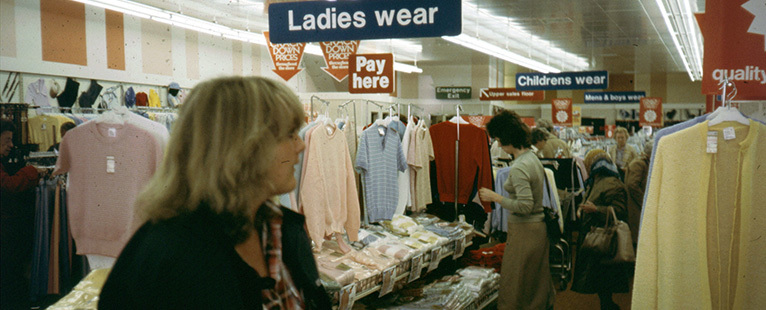
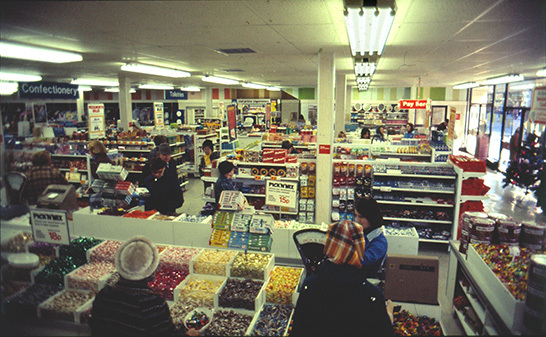 But by opening day the store looked magnificent. Shoppers who had watched the giant structure going up, were amazed when the brown paper that had been lining the windows was removed to reveal the huge, brightly lit salesfloor.
But by opening day the store looked magnificent. Shoppers who had watched the giant structure going up, were amazed when the brown paper that had been lining the windows was removed to reveal the huge, brightly lit salesfloor.
News of a celebrity opening brought a huge crowd to the narrow pavement in Potter Street. By 9am on Thursday 7 December every parking space in the town was taken. As Bill Pell prepared to cut the ribbon to open his store, a voice boomed out "shoulders back, lovely boy" to great applause, heralding the arrival of the popular TV Star Windsor Davies.
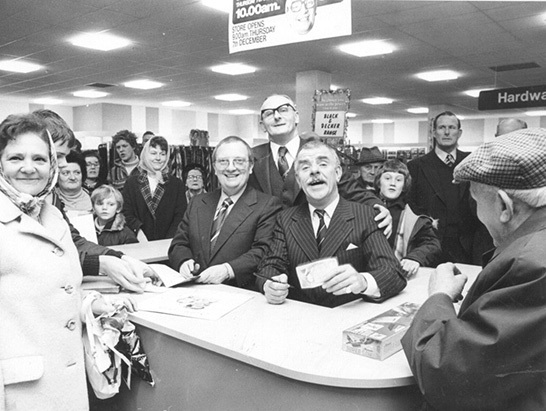
Davies was accompanied by his co-star Don Estelle from the legendary BBC sitcom It Ain't Half Hot Mum. The two men (who had become regulars in the retailer's television advertising) drew a big crowd. They held court at a central cash desk, signing autographs and telling tall tales of life in rep and during filming.
As Bill Pell looked on, the diminuitive Estelle showed off his magnificent voice with an impromptu rendition of his popular hit Whispering Grass, with Windsor Davies joining in for the chorus.
The stars and the store were a huge hit with the people of Bishops Stortford.
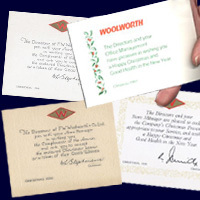
Over the next two years, against the trend of the rest of the chain, the store prospered and grew, attracting shoppers from miles around. Little by little the systems were tuned to get more of the right and less of the wrong stock, thanks to a mountain of scribbled notes to the office.
As Bill Pell prepared for his last Christmas as a Manager, the world had turned full circle. In 1939 he had received a £1 Christmas bonus from the Board and his Store Manager; now he had to stuff more than a hundred envelopes with cards and between £10 and £200 for his people. The learner had become a teacher, with Management Trainees and an Assistant Manager 'Readyman' under his wing, picking up skills for their own careers. Over forty-two years he had opened two new stores and had seen the top price rocket from sixpence (2½p) to £269.95 (for a colour TV or a greenhouse), and had seen Woolworth reinvent itself over and over again.
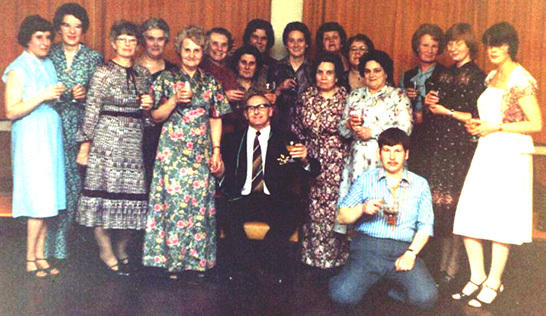
In his early career Bill had put his family first, forsaking the greasy pole. He built and valued loyalty and earned his people's respect. He proved that it was possible to get to the top while remaining honourable, decent and fair, through hard graft, teamwork and knowing your public.
His staff laid on a memorable send-off when he retired in March 1981. The Woolworth News Retirement Special 1981 finally acknowledged that he had completed not thirty-six but a remarkable forty-two years with F.W.W.
Bill always took great pride in having worked for Woolworth's and would always make a point of searching out the local FWW store in towns he visited and would often introduce himself to the manager. Following his retirement, he and Joan moved back to Teignmouth, allowing him to pop into his old store regularly for a chat. He died in 2009, shortly after his wife Joan. He had been suffering from Alzheimer’s and so he was spared the full knowledge of the collapse of the chain; it would have broken his heart if he had fully understood.
What is most remarkable about his story is that he wasn't unique. He was one of hundreds of Woolworth Managers who provided the backbone of the company and pursued similar careers. But very few commanded the same respect at District and Executive Office as such a solid and dedicated pair of hands. It was no accident that in changing times every store that he had managed survived to the final day in the High Street.
We are profoundly grateful to his daughters, Pam and Christine, for sharing the story and honouring the memory of one of Woolworth's finest sons.
